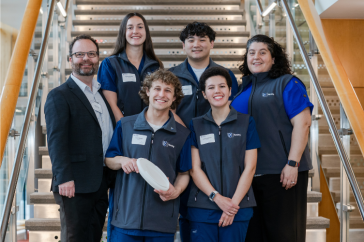It’s coming up on a year since the annual Social Venture Innovation Challenge put hard cash into the hands of budding entrepreneurs, and we thought we'd check in with a couple of the winners to see where they are with their ventures.
Food deserts are areas where residents have limited access to fresh and affordable food. In metropolitan food deserts, residents must travel more than a mile to reach a grocery store — often by bus, subway or on foot. In rural food deserts, residents travel more than 10 miles to reach the nearest market.

Shannon and Bradley Calabro (center) after winning the 2014 Social Venture Innovation Challenge
This is more than just an inconvenience for the 23 million Americans who live in food deserts; it’s a public health problem. Limited food access leads to less healthy eating habits and increased incidences of obesity and diabetes.
Bradley and Shannon Calabro '15G would like to make food deserts history.
They envision buses, retrofitted to serve as mobile markets that visit many neighborhoods daily, carrying healthy items such as fresh produce and proteins into areas where such foods are hard to find, expensive or non-existent.
Last fall, the husband-wife team entered their idea for Amano Mobile Grocery Stores into the Social Venture Innovation Challenge (SVIC), the competition, now in its third year, that shines a light on novel ideas for businesses aimed at solving pressing social or environmental problems.
“It was just an idea when we entered,” says Bradley Calabro '15G. “At the time I was taking the entrepreneurship class in Paul College; the class is centered on developing an idea for a business. My wife was in the master’s of social work program where she bumped into the food desert problem regularly.”

They entered the idea and went on to win the student division of the competition, taking home $5,000 plus free consulting services and other business boosters to help them bring their idea from concept to curbside.
“We’re extremely grateful,” Calabro says. “It was great to see that people were receptive to the idea, and it was a good way to start a dialogue with potential investors.”
He says the competition energized them and they started off “really gung-ho,” but now the couple is taking a more measured approach to building their budding enterprise. Currently they’re focusing on research and planning.
A Sensible Venture
 Andrew Jaccoma '12G, founder of Sensible Spreader Technologies, took home a $10,000 check after winning first-place in the community division of the 2014 Social Venture Innovation Challenge. Today, Jaccoma’s technology is riding with road crews in four municipalities and a state agency.
Andrew Jaccoma '12G, founder of Sensible Spreader Technologies, took home a $10,000 check after winning first-place in the community division of the 2014 Social Venture Innovation Challenge. Today, Jaccoma’s technology is riding with road crews in four municipalities and a state agency.
“Potential investors in the business will want to see a proven model, and within the next year, we’d like to pilot the idea,” Calabro says.
That’s a smart approach, says Jeffrey Sohl, director of the Center for Venture Research at Paul College.
“Too many people jump in too early and they’re just not ready for prime time,” Sohl says. “And once you’ve got capital from investors, you must succeed, so it’s a very good idea to step back, get the pieces in order, get some traction.”
Traction is what the Calabros are looking for, and they’re on the right track. They have a new logo; they’re figuring out permitting and distribution requirements; they’re saving money; and they’ve tucked away most of their SVIC winnings for “prime time."
When the first bus rolls into a Greater Boston food desert, they’ll know that Amano Mobile Grocery Stores has arrived.
Registration is open for the 2015 Social Venture Innovation Challenge.
What’s your idea? Alex Freid ’13, winner of the first SVIC, says, “Turn your wild idea into reality.”
The Social Venture Innovation Challenge is co-hosted and organized by the Peter T. Paul College of Business and Economics, the Carsey School for Public Policy, the Sustainability Institute, NH EPSCoR, Net Impact UNH and UNH Innovation. Supporters include Timberland, the New Hampshire Charitable Foundation, PixelMEDIA, AlphaLoft and New Hampshire Business Review.
-
Written By:
Tracey Bentley | Communications and Public Affairs
















































